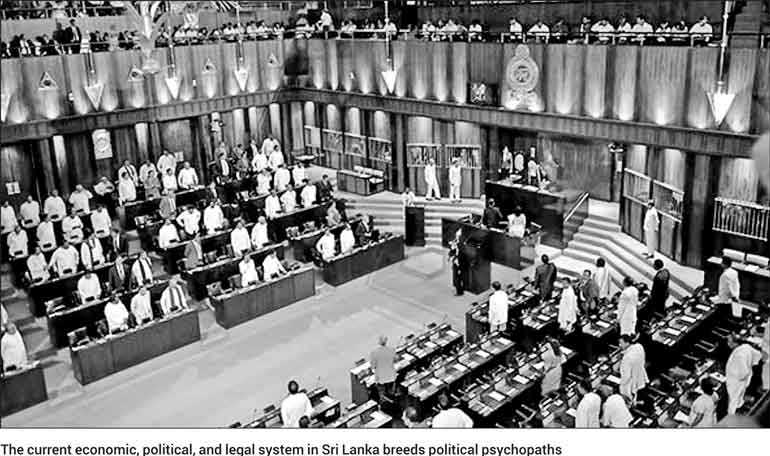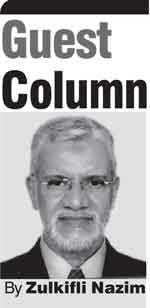Wednesday Feb 18, 2026
Wednesday Feb 18, 2026
Saturday, 6 April 2019 00:10 - - {{hitsCtrl.values.hits}}

 Robert Hare, the leading expert on psychopathy as a mental disorder, who devised a psychopathic checklist, observed that psychopaths representing just one percent of the general population possess an especially heightened need for both power and prestige, seemingly prerequisite essentials for every aspiring politician. A startling accuracy of referring to politicians as ‘psychopaths’.
Robert Hare, the leading expert on psychopathy as a mental disorder, who devised a psychopathic checklist, observed that psychopaths representing just one percent of the general population possess an especially heightened need for both power and prestige, seemingly prerequisite essentials for every aspiring politician. A startling accuracy of referring to politicians as ‘psychopaths’.
It is an understanding among honourable and educated elite to think of politicians being natural-born psychopaths – Callous, manipulative, exploitative, unrepentant and smarmy – these are the diagnostic traits of the psychopath. And it seems so right.
As the 21st century gets into its stride, we judge politicians to be self-serving and not straight-talking but also out of touch, all the same, and a joke.
This finding cannot be dismissed as simply a reflection of a general culture of deference at the time. In the same responses, people wrote about doctors as ‘selfish’ and ‘ignorant’, scientists as ‘inhuman ’with ‘one-track minds’, and lawyers as dishonest, thieving‘ sharks ’Citizens described their ‘loathing’ for politicians who made them ‘angry’, ‘disgusted’, and‘ depressed.
The current economic, political, and legal system in Sri Lanka breeds political psychopaths. We are on a path of rewarding psychopathic behaviour and punishing those with conscience and integrity.
Political psychopaths are in love with power and risk taking, masters of manipulation, self-serving opportunism and self-aggrandisement, and hold virtual doctorates in deceit and deception; and they can comfortably operate without conscience, guilt or any genuine level of empathy toward others.
The behaviour and speeches of our politicians both in and outside the Parliament show that these political psychopaths are highly skilled at playing others in order to get what they want.
We have been primed for extravagant hope. We’ve been deceived into thinking that if we work really, really hard, we’ll own that dangling carrot. But nothing could be further from the truth. We are a nation awash in hope.
These scheming politicians are keenly perceptive at reading people, understanding their motives and values, brilliant at learning their weaknesses and blind spots, and highly effective at inducing both sympathy and guilt in others. They appear to be caring and considerate, but only on the most superficial, disingenuous level – It means that they are not straightforward, giving a false appearance of frankness at every turn.
The supporters of politicians, collaborators, confederates and partners in crime have an uncanny ability to pick brains, soliciting information, knowledge, creative ideas and even secrets from others. These scoundrels opportunistically utilise them to their own advantage parading them as their own ideas and knowledge, and craftily taking and receiving undeserving credit and accolades from bosses and those in power.
Equally our politicians are also gifted actors, able to take on chameleon-like colours according to their particular social setting and company. Though they lack a capacity to feel emotions with any depth or intensity, as actors and manipulators they are able to manufacture crocodile tears for effect whenever it suits and benefits them. Their obtuse and reprehensible acts become acceptable.
They have no trouble putting on the act of emotions when they are determined to manipulate others most often into feeling guilty or sympathetic toward them. The only genuine emotion these psychoneurotics express is anger whenever their manipulations are thwarted or rebuffed.
We have seen them use intimidation tactics and behave impulsively and even violently when angered, especially in response to a perceived personal insult or perceived betrayal of trust or perceived lack of respect for their authority. They are perennial predators bloodthirstily lusting for more and more power. But most often their emotional tirades are to manipulate, gain power and control over others.
Their gamey nature and sexual impropriety, lusts for insatiable desire to win at all costs, and a gloating, short lived gratification that brings victor’s spoils.
(The term victor’s spoils was derived from the phrase “to the victor belong the spoils” by New York Senator William L. Marcy, referring to the victory of Andrew Jackson in the election of 1828, with the term spoils meaning goods or benefits taken from the loser in a competition, election or military victory.)
A politician spends more time, energy and money trying to get elected/and re-elected to public office than any other single pursuit or pastime. In this pragmatic way, the psychopathic description that they are mere public cons and hustlers selling themselves on the highest, competitively demanding stage is neither too simplistic nor an exaggeration.
Just as effective as they are at absolving themselves of any and all responsibility and culpability of being completely blameless, they are equally skilled at pointing the finger at others and throwing them under the bus. In order to get elected and stay elected, they use their chief assets of cunning charm and capacity to fabricate seamlessly at will, their power to manipulate.
Once these political degenerates believe others have served their purpose, they are deemed no longer of any real value and quickly disposed of, discarded and/or betrayed.
What are we going to do about it? We are aware that whether we like it or not we have to dwell in such an atmosphere, engage in collective conversations and try to do our best hoping for a reasonably better future for our country and its citizens.
In conclusion, we have shown that popular images of the good politician have changed and as such it has become our bounden duty to establish a new image rooted in the professionalisation of politics, the ideology of intimacy, and democratic egalitarianism.
We understand that this new image is more difficult for politicians to perform. It is more demanding, since it asks politicians to be not only for the people–to be honest, capable, moderate, and strong–but also of the people–to be ‘normal’ and ‘in touch’ with ‘real’ life and ‘ordinary’ people.
In addition, the professionalisation of politics means that politicians are less able collectively to represent the different virtues expected of them. Furthermore, the contexts of interaction between politicians and citizen have changed. The modes of interaction afforded by media events and professionalised campaigning make it more difficult for politicians to perform virtues and for citizens to calibrate judgments.
Citizens want a multi-faceted relationship with their elected representatives but are offered a series of one-dimensional experiences that disappoint and frustrate and so provide the driving force behind negative attitudes towards formal politics.
We should be able to guide mainstream institutional practices that might lend themselves to a process by which citizens could judge politicians in a multi-dimensional way.
Finally, the outcomes of the political process are seldom clear-cut. For long periods, there appears to be nothing noble about politics at all. Politics, after all, is a battle for influence and the exercise of power. That this activity involves politicians in hustle, intrigue, lies, and deceit provides little surprise to most citizens who have long understood that politics is prone to such a dynamic.
Politics has the quality of being both the decent pursuit of the common good and a rather unedifying process that involves humans behaving badly. So, any reforms offered will have to embrace this split personality of politics and work with the grain of an inherently imperfect system.
Concluding with a point to ponder: “In his book ‘Manufacturing Consent,’ Noam Chomsky writes about how ‘elementary truths’ are consistently overlooked because the state does such a good job of obfuscating what is really going on. This obfuscation is essential in a free society where there always exists the threat that a free population might hinder the mechanisms of power.”